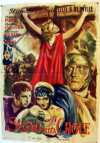What is the Praeses planning?
Barbaria hung, groaning from her nails on the cross. Her world had shrunk to the space of her own body; nothing else seemed to exist. In her nostrils, she smelled her own sweat, her urine, and her blood. She heard nothing except the pounding of her heart desperately pumping life-sustaining blood. All she knew was the shooting pain still coming from her wrists and feet, the cramping spasms of her trembling arm and leg muscles, the stinging cuts and bruises of her flogging on her back and front, the multiple tearings of her cunt, and the burning deep in her chest as her lungs pleaded for air. She had no thought beyond riding out and enduring these agonies. She wanted to die, but the will to live still dominated. She could not surrender - yet.
The Centurion gave his Governor a quick glance of surprise. What was this man thinking, he wondered? Take her down from the cross this late? “Not likely, I think.” said the Centurion with deliberate slowness. “But I am no medicus* (physician). I have seen men, wounded in battle, who seemed to have no life left in them who came back and lived a long time. She could recover, I suppose. Why would you ask, Praeses?”
The Governor met the eyes of the soldier for an instant and then quickly looked away as if in shame. "Just curiosity, I guess. However, it appears that we are not going to find that answer today," he said with much sadness in his voice. He looked back and put his hand on Calixtus’s shoulder. "I wish to thank you for the support and effort you and your men have provided in this matter. I know it hasn't always been easy. And not necessarily to your liking, Centurio."
The Centurion began to object, but Gaius held up his hand. “It’s alright, Centurio. I know you are a man of duty, and I've always counted on you following my orders no matter what your personal feelings. But I can see your distaste at this. Honestly, I share much of it. But I couldn't go against the crowd. All government leaders now are hanging by a thread as the Augusti et Caesares (Emperors and co-Emperors) battle each other, and the Barbari (Savage Barbarians) threaten our borders.” Calixtus nodded knowingly.
“If only fate had helped my messager to find the Vicarius!” sighed Antonious.
“Fata has played her role in this drama, to be sure,” replied Calixtus. “If that band of thieves, masquerading as provincial militia, hadn’t stumbled across her on the road, the Goth girl would be safe at home now.”
“And you and I would also be at home, relaxing at cena (dinner).”
Calixtus gave an ironic smile and nodded agreement.
A few minutes later, as if in answer to the Governor’s prayer, the main gate of the Amphitheater, opposite the Box, opened, and a man, covered in road dust, hurried in and ran across the arena toward the Box.
“My man!” shouted the Praeses.
He and Calixtus moved to the top of the stair to meet him.
The messenger, covered in dust and sweat, came up the stairs, almost passing out from this final exertion. He reached the Box, fell, panting, on one knee before the Governor, and, unable to find the breath to speak, just held out his hand with a small parchment scroll.
Though he wanted with all his soul to rip the scroll open, the Praeses had rules to follow. First, in the presence of Calixtus as a witness, he examined and confirmed that the seal was the vicar's and was intact. With this established, he moved with the Centurion to an isolated part of the Box. There he broke the seal and unrolled the small piece of parchment.
The first long section was the usual greetings from one government official to another, listing the many titles and dignitaries held by each. Omission of even one was a mortal insult, grounds for a major rift, if not actual violence. Their presence assured him that the missive was genuine. Gaius Antonious looked next to the body of the text, which was only a couple of sentences.
*medicus – a physician or healer. Then, as now, these ranged widely in competence from scientific, educated ones to quacks and butchers. The Roman poet Martial (about 90 AD – inventor of the modern epigram) had this to say about a medicus he knew:
Nuper erat medicus, nunc est vespillo Diaulus:
quod vespillo facit, fecerat et medicus.
(Recently was Diaulus a doctor, now he is an undertaker. What the undertaker now does the doctor too did before.)














